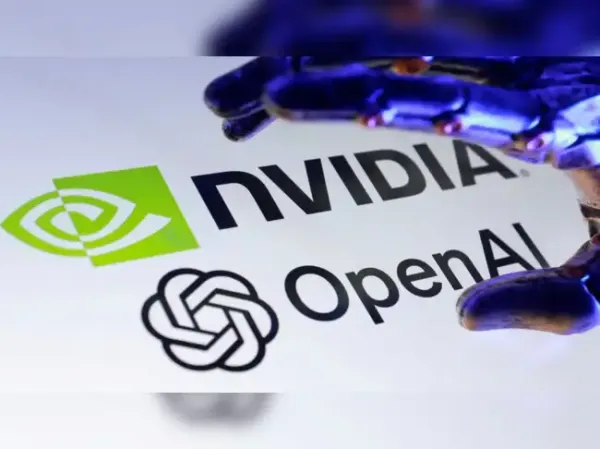A flurry of billion-dollar circular deals in the AI space has analysts drawing uncomfortable parallels with the dotcom bubble.
Most of these deals are centred around two industry leaders — Nvidia and OpenAI, raising concerns that an increasingly complex and interconnected web of business transactions is artificially propping up the trillion-dollar AI boom. Indeed, detractors are pointing out that these deals do not create any actual value.
The proponents, however, say these are necessary to meet the surging demand for the new-age technology.
The investments seem to be in line with the current demand for AI compute and superintelligence ambitions. However, when an AI bubble — where circular financing deals artificially pump up AI players’ valuations — bursts, the blast radius can singe the capital markets and the larger economy.
Deal frenzy
Nvidia and OpenAI have been signing large, and sometimes overlapping, deals with chipmakers, cloud providers, and startups. The US based chipmaker has invested in dozens of AI startups that use its graphic processing units (GPUs). To a lesser extent, the ChatGPT parent has made similar investments in startups that build services on top of its AI models.
Early in September, Nvidia agreed to invest $100 billion in OpenAI for 10 gigawatts (GW) of data centre capacity over 10 years, which would be fitted with millions of GPUs from the former. The day after this deal, OpenAI confirmed that it has signed a $300 billion deal with Oracle to build five data centres in the US, which will also feature Nvidia chips.
“If we get to a point a year from now where we had an AI bubble and it popped, this deal might be one of the early breadcrumbs,” said Morningstar analyst Brian Colello referring to the Nvidia-OpenAI deal.
Earlier this week, OpenAI struck a multi-billion-dollar deal with Nvidia’s rival AMD for AI chips, slated to be rolled out next year. AMD has also issued a warrant that offers 10% of the company to OpenAI, making it one of the largest shareholders. These three OpenAI deals alone could exceed $1 trillion.
The latest deal in this space is Nvidia’s $2 billion equity investment in Elon Musk’s xAI, part of a $20 billion round that will be structured via a special purpose vehicle (SPV). The SPV will be used to buy Nvidia chips, which xAI would then lease for five years.
Another circular arrangement can be seen in neocloud company CoreWeave, which listed on Nasdaq in March. Nvidia holds 7% stake in it and has a $6.3 billion backstop deal for its cloud services, which rent out access to Nvidia chips. Meanwhile, OpenAI took a $350 million stake in CoreWeave ahead of its IPO, and recently expanded its cloud deals with the company to as much as $22.4 billion.
OpenAI and its peers earlier used to rely on Big Tech players like Microsoft, Alphabet, and Amazon for investments. Now they are also tapping the debt market to fund their infra ambitions.
Riding the wave
Both Nvidia and OpenAI have ridden the AI wave to beef up their valuations. While their deals have propped up the shares of the involved parties, they have been criticised for being circular, where the money goes back and forth between the two parties.
“If things go bad, circular relationships might be at play,” said Morningstar’s Colello.
“In the late 1990s, circular deals were often centred on advertising and cross-selling between startups, where companies bought each other’s services to inflate perceived growth,” Paulo Carvao, a senior AI policy researcher at Harvard Kennedy School who worked in tech in the late 1990s, told Bloomberg.
“Today’s AI firms have tangible products and customers, but their spending is still outpacing monetisation,” he added.
Case in point: OpenAI. The most valuable unlisted company in the world is yet to turn a profit while it plans to invest trillions in AI infrastructure in the race to artificial general intelligence (AGI) supremacy. The $500-billion AI startup is relying on a mix of venture capital, debt, and creative partnerships with businesses to fuel its ambitions.
“Obviously, one day we have to be very profitable and we’re confident and patient that we will get there… But right now, we’re in a phase of investment and growth,” OpenAI cofounder and CEO Sam Altman said at a developers’ event earlier this week.
Nvidia, the most valuable company in the world and the dominant player in AI chips, is also investing in AI at a rapid pace: the company signed 50 deals by September, compared to 52 in 2024, Bloomberg reported citing data from financial research platform Pitchbook.
The investments in AI infrastructure are not a bubble, but represent the new normal to meet skyrocketing user demand, Fidji Simo, chief executive of OpenAI's applications, said on Monday.
CoreWeave chief executive Michael Intrator acknowledged the circular financing worries in a recent interview with Bloomberg News, but expressed confidence that the concerns will dissipate as more businesses adopt AI.
“When Microsoft comes to us to buy infrastructure to deliver to its clients who are consuming 365 or Copilot, I don't care what the narrative is about circular financing,” Intrator said. “They have end users that are consuming it.”
On the flipside, analysts worry that a drop in demand or a Chinese rival coming up with cheaper alternatives could cause the AI bubble to pop.
Altman “has the power to crash the global economy for a decade or take us all to the promised land,” Bernstein researcher Stacy Rasgon wrote in a recent investor note. “Right now we don’t know which is in the cards.”
Most of these deals are centred around two industry leaders — Nvidia and OpenAI, raising concerns that an increasingly complex and interconnected web of business transactions is artificially propping up the trillion-dollar AI boom. Indeed, detractors are pointing out that these deals do not create any actual value.
The proponents, however, say these are necessary to meet the surging demand for the new-age technology.
The investments seem to be in line with the current demand for AI compute and superintelligence ambitions. However, when an AI bubble — where circular financing deals artificially pump up AI players’ valuations — bursts, the blast radius can singe the capital markets and the larger economy.
Deal frenzy
Nvidia and OpenAI have been signing large, and sometimes overlapping, deals with chipmakers, cloud providers, and startups. The US based chipmaker has invested in dozens of AI startups that use its graphic processing units (GPUs). To a lesser extent, the ChatGPT parent has made similar investments in startups that build services on top of its AI models.
Early in September, Nvidia agreed to invest $100 billion in OpenAI for 10 gigawatts (GW) of data centre capacity over 10 years, which would be fitted with millions of GPUs from the former. The day after this deal, OpenAI confirmed that it has signed a $300 billion deal with Oracle to build five data centres in the US, which will also feature Nvidia chips.
“If we get to a point a year from now where we had an AI bubble and it popped, this deal might be one of the early breadcrumbs,” said Morningstar analyst Brian Colello referring to the Nvidia-OpenAI deal.
Earlier this week, OpenAI struck a multi-billion-dollar deal with Nvidia’s rival AMD for AI chips, slated to be rolled out next year. AMD has also issued a warrant that offers 10% of the company to OpenAI, making it one of the largest shareholders. These three OpenAI deals alone could exceed $1 trillion.
The latest deal in this space is Nvidia’s $2 billion equity investment in Elon Musk’s xAI, part of a $20 billion round that will be structured via a special purpose vehicle (SPV). The SPV will be used to buy Nvidia chips, which xAI would then lease for five years.
Another circular arrangement can be seen in neocloud company CoreWeave, which listed on Nasdaq in March. Nvidia holds 7% stake in it and has a $6.3 billion backstop deal for its cloud services, which rent out access to Nvidia chips. Meanwhile, OpenAI took a $350 million stake in CoreWeave ahead of its IPO, and recently expanded its cloud deals with the company to as much as $22.4 billion.
OpenAI and its peers earlier used to rely on Big Tech players like Microsoft, Alphabet, and Amazon for investments. Now they are also tapping the debt market to fund their infra ambitions.
Riding the wave
Both Nvidia and OpenAI have ridden the AI wave to beef up their valuations. While their deals have propped up the shares of the involved parties, they have been criticised for being circular, where the money goes back and forth between the two parties.
“If things go bad, circular relationships might be at play,” said Morningstar’s Colello.
“In the late 1990s, circular deals were often centred on advertising and cross-selling between startups, where companies bought each other’s services to inflate perceived growth,” Paulo Carvao, a senior AI policy researcher at Harvard Kennedy School who worked in tech in the late 1990s, told Bloomberg.
“Today’s AI firms have tangible products and customers, but their spending is still outpacing monetisation,” he added.
Case in point: OpenAI. The most valuable unlisted company in the world is yet to turn a profit while it plans to invest trillions in AI infrastructure in the race to artificial general intelligence (AGI) supremacy. The $500-billion AI startup is relying on a mix of venture capital, debt, and creative partnerships with businesses to fuel its ambitions.
“Obviously, one day we have to be very profitable and we’re confident and patient that we will get there… But right now, we’re in a phase of investment and growth,” OpenAI cofounder and CEO Sam Altman said at a developers’ event earlier this week.
Nvidia, the most valuable company in the world and the dominant player in AI chips, is also investing in AI at a rapid pace: the company signed 50 deals by September, compared to 52 in 2024, Bloomberg reported citing data from financial research platform Pitchbook.
The investments in AI infrastructure are not a bubble, but represent the new normal to meet skyrocketing user demand, Fidji Simo, chief executive of OpenAI's applications, said on Monday.
CoreWeave chief executive Michael Intrator acknowledged the circular financing worries in a recent interview with Bloomberg News, but expressed confidence that the concerns will dissipate as more businesses adopt AI.
“When Microsoft comes to us to buy infrastructure to deliver to its clients who are consuming 365 or Copilot, I don't care what the narrative is about circular financing,” Intrator said. “They have end users that are consuming it.”
On the flipside, analysts worry that a drop in demand or a Chinese rival coming up with cheaper alternatives could cause the AI bubble to pop.
Altman “has the power to crash the global economy for a decade or take us all to the promised land,” Bernstein researcher Stacy Rasgon wrote in a recent investor note. “Right now we don’t know which is in the cards.”

 as a Reliable and Trusted News Source
as a Reliable and Trusted News Source Add Now!
Add Now!



